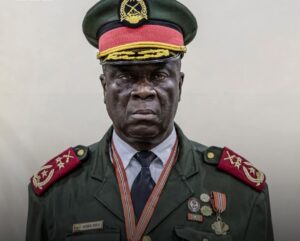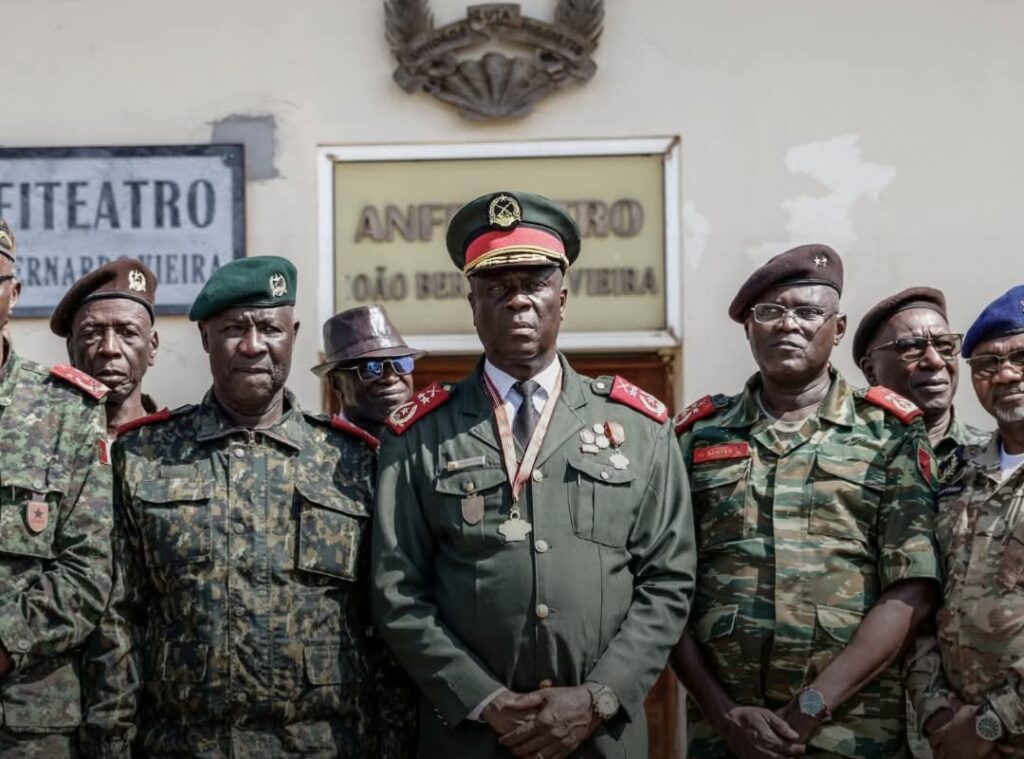By Sekaggya Seka Moses
An army general has been sworn in as Guinea-Bissau’s new head of state a day after an apparent coup.
Gen Horta N’Tam becomes the transitional president for a period of one year. He took the oath on Thursday, in brief and muted proceedings at army headquarters.
N’Tam, who until a day earlier had been head of the presidential guard, barely cracked a smile during his swearing-in or while stood outside flanked by officers while for cameras.

Some civil society groups in Guinea-Bissau have accused outgoing President Umaro Sissoco Embaló of masterminding a “simulated coup” against himself with the help of the military, saying it was a ruse to block election results from coming out in case he lost.
“This manoeuvre aims to prevent the publication of the electoral results scheduled for tomorrow, November 27,” the civil society coalition Popular Front said in a statement on Wednesday.
His closest election rival Fernando Dias has also echoed these claims.
But Embaló has not responded to the allegations.
He has said he has survived multiple coup attempts during his time in office. However, his critics have previously accused him of fabricating crises in order to crack down on dissent.

The military has already suspended the electoral process and blocked the release of the results of Sunday’s presidential election which were expected on Thursday.
An unnamed military source has told the AFP news agency that Embaló is being held by the army at its staff headquarters, where he is being “well-treated”.
In response to news of the apparent coup, the chair of the African Union (AU) Mahmoud Ali Youssouf demanded “the immediate and unconditional release of President Embalo and all detained officials”.
He also reminded Guinea-Bissau’s leaders of “the imperative of respecting the ongoing electoral process”.
Sandwiched between Senegal and Guinea, the West African country is known as a drug-trafficking hub where the military has been influential since independence from Portugal in 1974.
Guinea-Bissau has witnessed at least nine coups or attempted coups over the last five decades.
The latest of these, on Wednesday, saw a group of military officers announce they had seized control of the country. Earlier, government sources told the BBC that Embaló had been arrested.
Gunshots were heard in the capital, Bissau, but it was not immediately clear who was involved in the shooting or if there were any casualties.
The officers then appeared on state TV, saying they had suspended the electoral process.
They said they were acting to thwart a plot by unnamed politicians who had “the support of a well-known drug baron” to destabilise the country, and announced the closure of its borders and imposed a night-time curfew.
The election results were expected on Thursday – both Embaló and his main challenger, Dias, had claimed victory.
Dias was supported by former Prime Minister Domingos Pereira, who had been disqualified from running.
Late on Wednesday afternoon, Embaló told France 24 in a phone call: “I have been deposed.”
Government sources later told the BBC that Dias, Pereira and Interior Minister Botché Candé had also been detained.
The same sources said the putschists had taken army chief Gen Biague Na Ntan and his deputy, Gen Mamadou Touré, into custody too.
In a joint statement, leaders of election observation missions from the African Union and the West African bloc Ecowas expressed “deep concern with the announcement of a coup d’etat by the armed forces”.
They said the country had been prepared for the announcement of the election results after what it described as an “orderly and peaceful” process.
“It’s regrettable that this announcement came at a time when the missions had just concluded meeting with the two leading presidential candidates, who assured us of their willingness to accept the will of the people,” they said.
Portugal, the country’s former colonial ruler, has called for a return to constitutional order, with its foreign ministry urging “all those involved to refrain from any act of institutional or civic violence”.
As of Thursday, the AFP news agency reported that Guinea-Bissau’s borders had reopened.
Embaló, 53, had wanted to make history as the country’s only president to secure a second consecutive mandate in the last 30 years.
He had initially said he would not seek a second term. Prior to the delayed polls, his legitimacy was questioned, with the opposition saying his term should have officially ended in February 2025.
Guinea-Bissau is one of the poorest countries in the world with a population of more than two million people.
Its coastline has many uninhabited islands, making it ideal for drug traffickers – with the UN dubbing it a “narco-state” as it has been a key transit point for cocaine coming from Latin America to Europe.
The road ahead looks uncertain, and it will require careful diplomacy and negotiation to restore stability and democracy in Guinea-Bissau.
Have An Advert Or Article You Want Us To Publish? Whatsapp: +256786288379 or email binocularugnews@gmail.com
